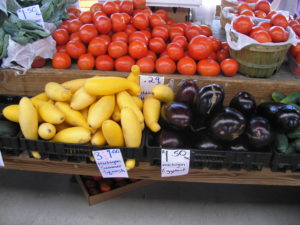By Stacie Scherman
Many low-income Flint residents now have greater access to lead-fighting fruits, vegetables, and milk, thanks to a recent Double Up Food Bucks expansion in Flint.
According to a press release, Fair Food Network (FFN), the nonprofit organization behind Double Up, has committed up to $750,000 to fund the expansion through December 2017.

According to Emilie Engelhard, communications director of FFN, the Double Up program came to Flint in 2011 and began at the Flint Farmers’ Market. In 2015, the program expanded to two Landmark Grocery Stores. Since the Flint expansion, which launched June 2016, three more Flint grocery stores have joined: The Local Grocer, Hutchinson Food & Drug, and Great Giant Supermarket.
Michigan residents with an Electronic Benefit Transfer Card (Bridge card) and state ID can sign up for a free Double Up card at any participating location. At the Flint Farmers’ Market, for every dollar spent on SNAP-eligible items using their Bridge cards, users earn a dollar credit on their Double Up cards, up to $20 per day.
At participating grocery stores, Double Up credits are earned through fruit, vegetable, and milk purchases only. Double Up credits can then be used to purchase fresh fruits and vegetables at any Double Up site, Engelhard said.
Before the expansion, users in Flint had to spend Double Up credits in the same grocery store in which they were earned (Farmers’ Market credits could be spent anywhere). Now, credits are transferrable between any participating store or vendor in the Flint Double Up network.
The Flint program also expanded its range of qualifying food items, which now includes any fruit or vegetable—fresh, canned, dried, or frozen—and milk. Outside of Flint, credits can be earned through and spent on fresh produce purchases only.
Engelhard explained that the purpose of the Double Up expansion in Flint is to increase access to nutrition, like calcium, to help fight lead exposure as a result of the water crisis. She said that adding stores to the Flint network, expanding the transferability of credits, and expanding qualifying foods will help make it easier for Flint families to access the nutrients they need.
Since the initial launch in 2011, 12,000 people in Flint have used the program, with approximately 3,500 unique users a year, Engelhard said. According to a FFN press release, in 2015 the Flint Farmers’ Market had the most Double Up credits redeemed of all participating Michigan markets.
The expansion supports local farmers, grocers, and market vendors as well. Engelhard said that the mission of the Double Up program, which was launched in 2009 in Detroit, is to create a “win-win-win” for low-income residents, food-growers, and the local economy. She explained that not only does the program help low-income residents buy more fruits and vegetables, it also helps farmers earn more money and keeps more dollars in the local economy. “All of these have a ripple effect,” she said.
Marianne Hartman, manager of J Deans Smoke House (Flint Farmers’ Market location), said, “I absolutely love (the program).” Hartman said since her location started accepting Bridge Cards, “sales are tremendous.”
Although Double Up credits cannot be spent at J Deans, which sells smoked meats, Hartman said she is happy to help customers add credits to their Double Up cards, which they can then spend at other vendors.
She also promotes the program to customers. “Anyone who doesn’t have a Double Up card, I tell them to get it. I explain the whole program, and send them to Pam [at the Friends of the Market booth] to sign up.”
The Flint Double Up expansion also includes increased promotion and community outreach. Jubek Yongo-Bure was hired as the Flint Coordinator for Strategic Outreach. Yongo-Bure said some of her outreach includes visiting churches, community organizations, and holding regular sign-ups at the Flint Public Library two days per week. Engelhard said that FFN created a branded printed material to display in the Flint Farmers’ Market and other participating stores, including banners, window signs, and clings for refrigerator and freezer doors.
Dana Voorheis, Food Navigator for the Michigan Farmer’s Market Association (MIFMA) and the Michigan Fitness Foundation, also helps promote the program at the Flint Farmers’ Market. On Thursdays, Voorheis works at a booth outside of the market’s main entrance with signs and flyers advertising Michigan Harvest of the Month and Double Up Food Bucks.
Voorheis explained that MIFMA’s mission is to support farmers, so it makes sense to help promote the Double Up program. She explained that people often come to her booth for the free Harvest of the Month recipes, and she uses the opportunity to tell them about the Double Up program. If they qualify and have not yet signed up, Voorheis will walk them back to the Friends of the Market booth. On a recent Thursday afternoon, Voorheis said, “Today is slow. I only helped five people sign up so far.”
Engelhard said that the success of the Double Up program overall, which now serves as a model for at least nineteen other states, helped pass a 2014 farm bill called Food Insecurity Nutrition Incentive program. FFN received the second largest grant from the bill, which helped support the recent Flint expansion, Engelhard said.
According to the FFN press release, other funding sources for the expansion include the Michigan Department of Agriculture and Rural Development, Michigan Department of Health and Human Services, Charles Stewart Mott Foundation, Community Foundation of Greater Flint, Kresge Foundation, Ruth Mott Foundation, W.K. Kellogg Foundation, and You Have Our Trust Fund of the NH Charitable Foundation.
Staff writer Stacie Scherman can be reached at sescherman@gmail.com.



You must be logged in to post a comment.